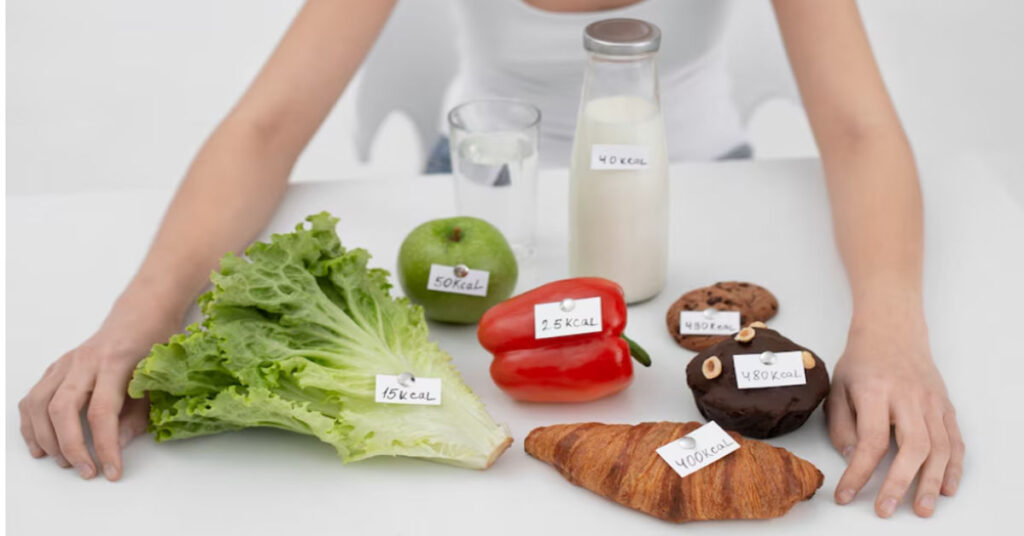When you want to lose weight, it can be hard to know what to eat. But the secret is simple: eat healthy foods that are good for you. In this guide, we’ll talk about foods that can help you lose weight. These foods are tasty and full of good stuff that your body needs. From yummy veggies to filling proteins and grains.
Leafy Greens:
Leafy greens such as spinach, kale, and Swiss chard are exceptionally low in calories while being packed with essential vitamins, minerals, and antioxidants. They’re high in fiber, which aids in digestion and helps you feel fuller for longer periods, reducing the likelihood of overeating. Incorporating leafy greens into your meals provides vital nutrients that support overall health and well-being. Their versatility allows them to be used in salads, soups, stir-fries, and smoothies, making it easy to incorporate them into your daily diet and support your weight loss goals without sacrificing taste or satisfaction.
Whole Grains:
Whole grains like quinoa, brown rice, oats, and barley are rich in fiber, vitamins, minerals, and antioxidants, making them a nutritious choice for weight loss. Unlike refined grains, whole grains retain their bran and germ, which contain valuable nutrients and fiber. The fiber content helps regulate blood sugar levels, aids in digestion, and promotes satiety, reducing the likelihood of overeating. Additionally, whole grains have a lower glycemic index compared to refined grains, which means they provide a more sustained release of energy, keeping you feeling full and energized for longer periods.
Lean Proteins:
Lean protein sources such as chicken breast, turkey, fish, tofu, and legumes are essential for supporting muscle growth and repair while aiding in weight loss. Protein has a high thermic effect, meaning it requires more energy to digest, which can help boost metabolism and calorie expenditure. Additionally, protein-rich foods help keep you feeling full and satisfied, reducing cravings and the desire to snack between meals. Incorporating lean proteins into your diet can help preserve lean muscle mass while promoting fat loss, making it easier to achieve and maintain a healthy weight.
Fruits:
Fruits such as berries, apples, oranges, and grapefruits are nutrient-dense foods that are rich in vitamins, minerals, antioxidants, and fiber. Their high water content and fiber make them filling and satisfying, while their natural sweetness can help curb cravings for sugary treats. Consuming a variety of fruits provides your body with essential nutrients while supporting hydration and digestive health. Including fruits in your diet can help satisfy your sweet tooth in a healthy way, making it easier to stick to your weight loss goals without feeling deprived or hungry.
Vegetables:
Incorporating a variety of vegetables such as broccoli, cauliflower, carrots, and bell peppers, into your meals provides essential nutrients while adding volume and flavor without excess calories. Vegetables are low in calories and high in fiber, vitamins, minerals, and antioxidants, making them ideal for weight loss. Their high water content helps keep you hydrated and feeling full, while their fiber content aids in digestion and promotes satiety. Adding vegetables to your meals not only boosts their nutritional value but also helps you feel satisfied and energized, supporting your weight loss efforts in a sustainable way.
Nuts and Seeds:
Nuts and seeds like almonds, walnuts, chia seeds, and flaxseeds are nutrient-dense foods that are rich in healthy fats, protein, fiber, vitamins, and minerals. Despite being calorie-dense, their combination of nutrients makes them a satisfying and nutritious addition to a weight-loss diet when consumed in moderation. The healthy fats found in nuts and seeds help keep you feeling full and satisfied, reducing the likelihood of overeating. Additionally, their protein and fiber content aid in digestion and promote satiety, making them a convenient and portable snack option for curbing cravings and supporting weight loss goals.
Greek Yogurt:
Greek yogurt is a creamy and delicious dairy product that’s rich in protein, calcium, probiotics, and essential nutrients. Its high protein content helps keep you feeling full and satisfied, while its probiotics promote digestive health and support a healthy gut microbiome. Choosing plain Greek yogurt without added sugars allows you to control your calorie intake while reaping its nutritional benefits. Greek yogurt can be enjoyed on its own, mixed with fruit or nuts, or used as a creamy topping for savory dishes, making it a versatile and convenient option for supporting weight loss and overall health.
Eggs:
Eggs are a nutrient-dense food that’s rich in high-quality protein, vitamins, minerals, and antioxidants. They’re particularly high in choline, a nutrient that supports brain health and metabolism. Despite being relatively low in calories, eggs are highly satiating, helping to keep you feeling full and satisfied between meals. Consuming eggs for breakfast has been shown to reduce calorie intake throughout the day and support weight loss efforts. Whether boiled, scrambled, or poached, eggs are a versatile and nutritious option that can be enjoyed as part of a balanced diet for improved weight management and overall health.
Legumes:
Legumes such as beans, lentils, and chickpeas are plant-based sources of protein, fiber, vitamins, and minerals that are beneficial for weight loss. Their high fiber and protein content helps keep you feeling full and satisfied, reducing hunger and cravings for unhealthy snacks. Additionally, legumes have a low glycemic index, which means they provide a slow and steady release of energy, helping to stabilize blood sugar levels and prevent spikes in insulin. Incorporating legumes into your meals provides essential nutrients while supporting digestive health and promoting satiety, making them a valuable addition to a weight-loss diet.
Avocado:
Avocado is a nutrient-dense fruit that’s rich in heart-healthy monounsaturated fats, fiber, vitamins, minerals, and antioxidants. Despite being calorie-dense, the fats found in avocados are beneficial for weight loss as they help keep you feeling full and satisfied. Additionally, avocados contain fiber, which aids in digestion and promotes satiety, reducing the likelihood of overeating. Their creamy texture and rich flavor make them a versatile ingredient that can be used in salads, sandwiches, smoothies, and dips, adding both nutrition and satisfaction to your meals while supporting your weight loss goals.
Chia Seeds:
Chia seeds are tiny black seeds that are packed with nutrients, including fiber, protein, omega-3 fatty acids, vitamins, and minerals. Despite their small size, chia seeds expand when mixed with liquid, forming a gel-like consistency that helps promote satiety and reduce appetite. Their high fiber content aids in digestion and promotes regularity, while their omega-3 fatty acids have anti-inflammatory properties and support heart health. Chia seeds can be added to smoothies, oatmeal, and yogurt, or used as a thickening agent in recipes, providing a nutritional boost and aiding in weight loss when consumed as part of a balanced diet.
Coconut Oil:
Coconut oil is a tropical oil extracted from the meat of coconuts and is known for its unique combination of fatty acids, including medium-chain triglycerides (MCTs). Despite being high in saturated fat, the MCTs found in coconut oil have been shown to boost metabolism and increase feelings of fullness, potentially aiding in weight loss when consumed in moderation. Coconut oil is also heat-stable, making it suitable for cooking and baking at high temperatures. While it can be included as part of a balanced diet, it’s essential to moderate your intake of coconut oil and consider its calorie density when aiming for weight loss.


